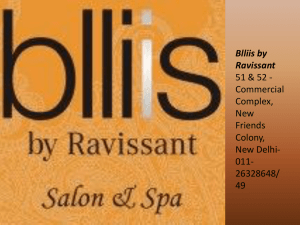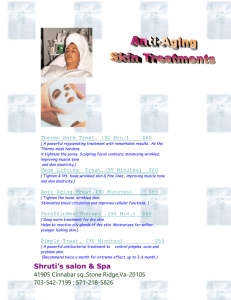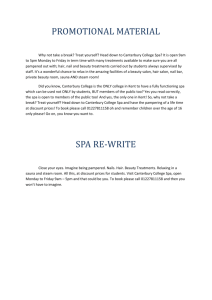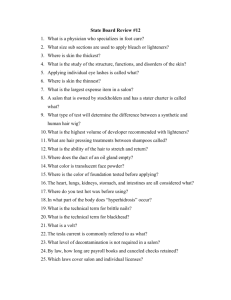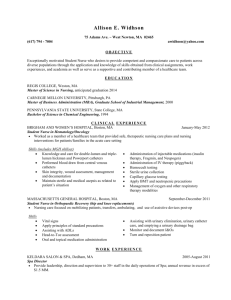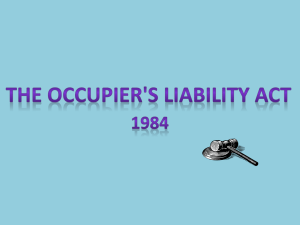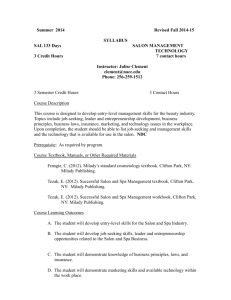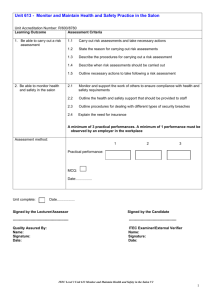Spa Select Case Study
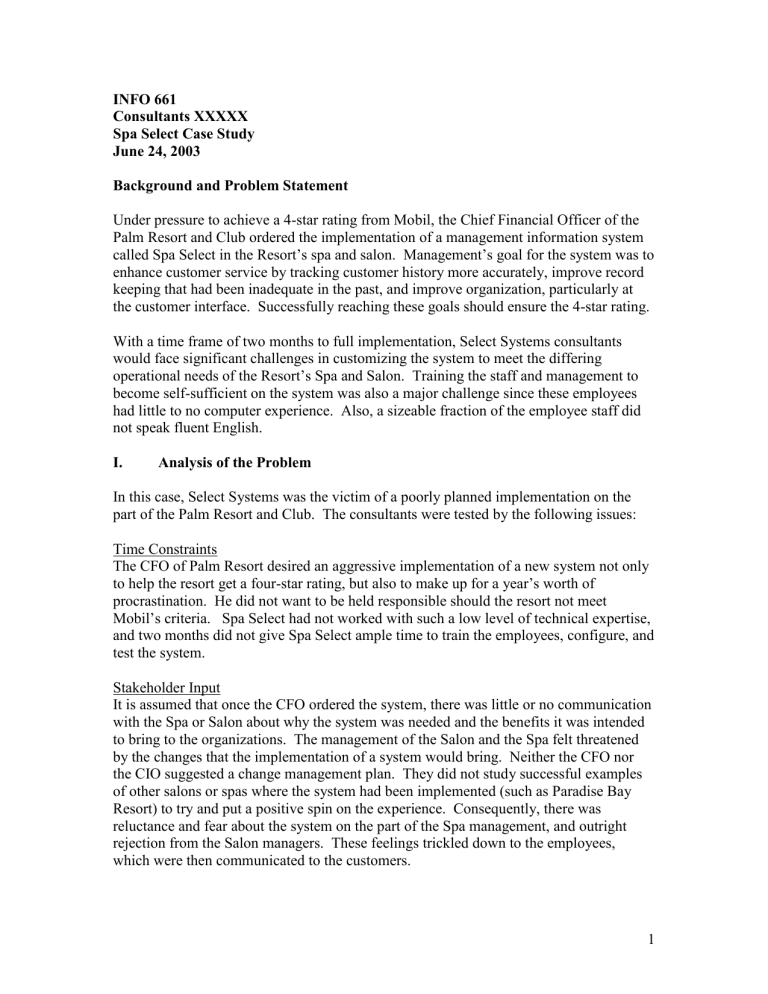
INFO 661
Consultants XXXXX
Spa Select Case Study
June 24, 2003
Background and Problem Statement
Under pressure to achieve a 4-star rating from Mobil, the Chief Financial Officer of the
Palm Resort and Club ordered the implementation of a management information system called Spa Select in the Resort’s spa and salon. Management’s goal for the system was to enhance customer service by tracking customer history more accurately, improve record keeping that had been inadequate in the past, and improve organization, particularly at the customer interface. Successfully reaching these goals should ensure the 4-star rating.
With a time frame of two months to full implementation, Select Systems consultants would face significant challenges in customizing the system to meet the differing operational needs of the Resort’s Spa and Salon. Training the staff and management to become self-sufficient on the system was also a major challenge since these employees had little to no computer experience. Also, a sizeable fraction of the employee staff did not speak fluent English.
I.
Analysis of the Problem
In this case, Select Systems was the victim of a poorly planned implementation on the part of the Palm Resort and Club. The consultants were tested by the following issues:
Time Constraints
The CFO of Palm Resort desired an aggressive implementation of a new system not only to help the resort get a four-star rating, but also to make up for a year’s worth of procrastination. He did not want to be held responsible should the resort not meet
Mobil’s criteria. Spa Select had not worked with such a low level of technical expertise, and two months did not give Spa Select ample time to train the employees, configure, and test the system.
Stakeholder Input
It is assumed that once the CFO ordered the system, there was little or no communication with the Spa or Salon about why the system was needed and the benefits it was intended to bring to the organizations. The management of the Salon and the Spa felt threatened by the changes that the implementation of a system would bring. Neither the CFO nor the CIO suggested a change management plan. They did not study successful examples of other salons or spas where the system had been implemented (such as Paradise Bay
Resort) to try and put a positive spin on the experience. Consequently, there was reluctance and fear about the system on the part of the Spa management, and outright rejection from the Salon managers. These feelings trickled down to the employees, which were then communicated to the customers.
1
The Spa and Salon were under separate management teams. While the Spa benefited from full-time, on-site management, the Salon’s manager (a famous stylist from L.A.) spent only 10 days per month on-site and the assistant manager 5 days. The Spa was team- and customer-focused, while the Salon was individualistic, focusing on artistic creation. The executive management of the resort did not step in to insist on full-time, on-site management at the Salon, which also made system implementation much more difficult because there was no encouragement of the employees or management direction on the operational needs of the Salon.
The Spa and Salon both employed manual systems for their scheduling and accounting.
As a result, their staffs had no computer experience. Coupled with language barriers on the part of some of the spa staff, this posed a huge threat to the success of the project with respect to the training-readiness of the staff. They needed considerable introductory training to become accustomed to using a computer before they could be effectively trained on the Select system. The time constraint did not allow for this introductory training. Again, this is an example of the company’s executive management ignoring the needs of another set of stakeholders, the users.
Additionally, customers were not consulted as stakeholders in this process. They had little knowledge about the system, such as its ability to track customer preferences or the possibility of a rewards program. Instead they heard negative comments from the staffs while frustrated themselves over lost reservations and slow service.
Technology Development
The operational structures of the two business segments differed in that the Spa was highvolume and the Salon much lower and at different times of the day. While Select
Systems had a relatively seamless system for spas, their salon system was fairly new.
The consultants would have to tweak the system to meet the business needs of the salon, such as the protocol for assigning appointments. The time constraint for implementation of the system did not allow for proper planning for the workflow.
II.
Alternative Solutions
There are several alternative solutions: a.
Abandon Spa Select and stay with a manual system. b.
Implement Spa Select, but extend the timeline on the implementation. c.
Implement Spa Select, but change management structure of Salon. d.
Implement Spa Select within time constraint and under current management structure.
2
III.
Criteria to Evaluate Alternatives a.
Will it meet needs of customers? b.
Will it meet the needs of executive management (achieve the 4-star rating)? c.
Will it meet the needs of users? d.
Will it improve operations? e.
Will the IS provide value and add to profitability? f.
Will it meet the desired time frame?
IV.
Evaluation of Alternatives a. Abandon Spa Select and utilize the current system.
Generally speaking, the current system works with no major recurring problems.
However, the manual nature of the current system lends itself to errors with customer relationship management. The employees also appear disorganized in front of the customer. The 4-star rating will likely not be achieved unless improvements are made in customer relationship management, and this alternative is not viable. b. Implement Spa Select, but extend the timeline on the implementation.
Although the training and implementation of the system took longer than anticipated, most of the errors encountered were human errors, which indicate further training is required. These errors could also be stemming from various employees in the organization being resistant to change. Therefore, the system is suitable for the business direction they want to head in. Better change management should be included as the implementation of the system progresses. Personnel issues should be dealt with by making employee performance ratings include buy-in to the new system. c. Implement Spa Select, but change management structure of Salon.
Due to the Salon’s transient management team, the Salon employees cannot fend for themselves. This needs to be corrected, and the Salon’s management must be required to train people for assuming more responsibility, such as an assistant manager position (s).
It sounds like the Salon’s management and employees are successful in keeping customers, which is critical to a Salon’s success; however, they need to support the drive for the 4-star rating. The management structure cannot be changed without losing talent, but these people must be forced to train and mentor their employees to assume greater responsibility. d. Implement Spa Select within time constraint and under current management structure.
A considerable amount of thought must go into training and change management for this initiative to be successful. There are not enough people in responsible roles to make the implementation happen in time. Unfortunately, procrastination on the part of executive management over the years stands in the way of implementing this system within the timeframe allotted to be considered for the next 4-star ratings review. Therefore, the system needs to be implemented, but a new timeframe should be carefully planned out to ensure the next “visit” by Mobil results in the 4-star rating.
3
V.
Recommendations
Our recommendation is to implement Spa Select with an extended timeframe. The executive management of the Palm Resort should develop a change management plan, map out business processes, and provide Spa and Salon staff with introductory computer training to increase their comfort levels with computers. In addition, the resort should add an additional assistant manager to the salon so that managerial coverage is provided at all times.
4
